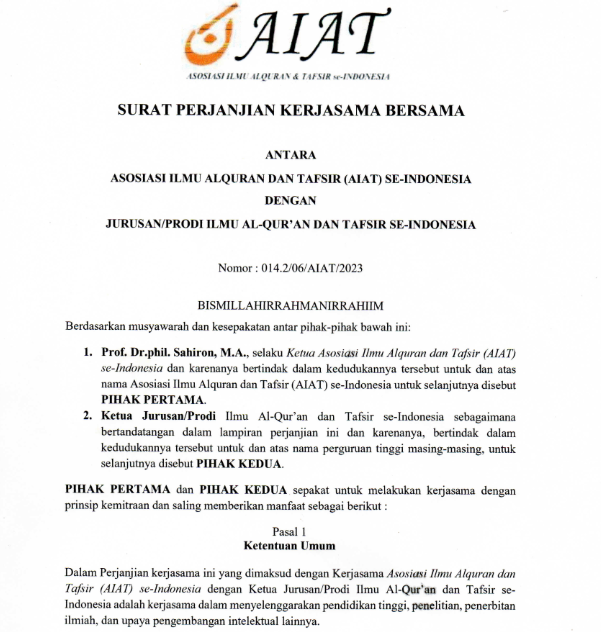Interperasi Kata Qātilū dalam Q.S. Al-Taubah (9): 29 Studi Analisis Kajian Ma‘nā cum Maghzā Sahiron Syamsuddin
 Abstract views: 274
,
Abstract views: 274
,
 PDF downloads: 348
PDF downloads: 348
Abstract
The verses of the Al-Quran have meanings and purposes related to the history behind the revelation of the verses. The meaning of verses can be explored by various approaches and methods of interpretation. This article examines the word qātilū in Q.S. At-Taubaḥ [9]: 29. The word often has a double meaning so it is understood incorrectly and only the external aspects are discussed. Basically the word qātilū in the Koran means "fight". But in fact the word qātilū in Q.S. At-Tubaḥ [9]: 29 is used as "legal" legitimacy to commit murder. Therefore, this study aims to reveal the meaning of the word qātilū using a descriptive analysis method. The theoretical approach used is the maʻna cum maghza theory initiated by Sahiron Syamsuddin. The process of interpretation in the maʻna cum maghza theory is carried out by: First, paying attention to the meaning of at-tarikhī or the meaning of the language intended by the author. Second, looking for significance (al-ma'na al-tarikhī) is paying attention to the historical context of the studied verse. Third, dynamic phenomenal significance (al-maghza al-mutharrik al-muʻasir). Primary source analysis was carried out by interpreting the word qātilū from various commentaries, the Koran, and supported by secondary sources in the form of relevant books, journals, and articles. The results of this research show that: First, the word qātilū means "fight" namely to the People of the Book, especially the Romans. Second, this verse refers to the permissibility of fighting when Islam is under pressure and threats such as territorial expansion by the people of the book in the Arabian peninsula, disobedience in paying jizya, torture of Muslims, etc. Third, this verse has asbabun nuzul, namely the context of the war with the Romans called Ghazwa al-ʻUra. Fourth, orders to fight are permissible when there are threats, violations of agreements, and rebellion against Islam. When these elements do not occur, fighting/killing other people is prohibited.
Downloads
References
Aṣfahānĭ (al), Ar-Rāghib, Mufradāt Alfaẓ Al-Qur’an. Damaskus: Dar al-Qalam, 2009.
Baqi (al), Muhammad Fuad Abd, Al-Mu’jam Al-Mufahras Li Alfadz Al-Quran Al-Karim. Beirut: Dar al-Ma’rifah, 1992.
Drajat, Amroeni. Ulumul Quran: Pengantar Ilmu-Ilmu Al-Quran. Jakarta: Kencana, 2017.
Hasbi, Muhammad Ash-Shiddiqy. Tafsir Al-Quranul Majid. Semarang. PT. Pustaka Rizki Putra, 2000.
Husein, Althaf Muzakky. “Interpretasi Ma’na Cum Maghzā Terhadap Relasi Suami-Istri dalam Q.S. Al-Mujadalah [58]: 1-4. Hermeneutik: Jurnal Ilmu Al-Quran dan Tafsir, Vol. 14. No. 1. 2020. DOI.10.1234/hermeneutik.v14iI.6569.
Ibrahim, Muhammad Al-Hifnawi. Tafsir Al-Qurthubi. tt: Pustaka Azzam, th.
Ja’far, Abu Muhammad bin Jarir Atha-Thabari. TafsirAt-Thabari. Jakarta: Pustaka Azzam, 2008.
Kulsum, Ummi Hasibuan. “Keadilan dalam Al-Quran: Interpretasi Ma’na Cum Maghzā Terhadap Q.S. Al-Hujurat [49] ayat 9”. Al-Fawatih. Vol. 1. No. 2. 2020.
Lajnah Pentashih Mushaf Al-Quran. Al-Quran dan Terjamahannya. Jakarta: Kemenag RI, 2019.
Liansi Tomi. Ayyubi (al) M. Zia. “Epistimologi Penafsiran Ayat-ayat Jihad: Studi Pemikiran Muhammad Chirzin dan Sahiron Syamsuddin”. Nun Jurnal Studi Al-Quran dan Tafsir di Nusantara. Vol. 8. No. 1. 2022.
Malik, Abdul Abdul Karim Amrullah. Tafsir Al-Azhar. Singapura: Pustaka Nasional, th.
Maraghiy (al), Mustafa, Tafsir Al-Maraghi Semarang: Toha Putra, 1974.
Munir, Abdul Mulkhan. Bilveer Singh. Demokrasi di Bawah Bayangan Mimpi N-11: Dilema Politik Islam dalam Peradaban Modern. Jakarta: PT Kompas Media Nusantara, 2011.
Pratama, M. Hendrik. “Kontekstualisasi Penafsiran QS Al-Nur (24); 31 (Aplikasi Hermeneutika Ma’na Cum Maghzā)”. Revelatia. Vol. 3. No. 2. 2022. https://doi.org/10.19105/revelatia.v3i2.6788.
Qardhawi, Yusuf. Fiqih Jihad: Studi Komparatif tentnag Hukum dan Filosofi Jihad dalam Pendnagan Al-Quran dan Sunnah. Jakarta: Cakrawala Publishing, 2010.
Ridha, Muhammad. Perang Hunain dan Perang Tabuk. tt: Hikam Pustaka, 2021.
Sari, Maula. “Analisa Sintagmatik dan Paradigmatik Ferdinand Dessausure Pada Q.S Al-Duha”. Maghzā. Vol. 5. No. 1. 2020.
Shihab, M. Quraish. Tafsri Al-Misbah: Pesan, Kesan dan Keserasian Al-Quean. Jakarta. Lentera Hati, 2002.
Syamsuddin, Sahiron. Hermeneutika dan Pengembangan Ulumul Quran. Yogya: Pesantren Nawasea Press, 2017.
Wasilatul, Umi Firdausiyah. “Urgensi Ma’na Cum Maghzā di Era Kontemporer: Studi Penafsiran Sahiron Syamsuddin atas Q 5: 51”. Contemporary Quran. Vol. 1. No. 1. 2021.
Wijaya Roma. Sholihatun Siti Malikah. “Interpretasi kata Sulthan (Kajian Ma’na Cum Maghzā Terhadap Q.S. Ar-Rahman [55] : 33)”. Al-Dzikra. Vol. 15. No. 2. 2021.
Kamus Arab Indonesia Almaany. Diakses pada 19 Desember 2022.
Bima Bagaskara, Menakar Motif Aksi Bom Bunuh Diridi Polsek Astana Anyar Bandung https://www.google.com/amp/s/www.detik.com/jabar/berita/d-6450102/menakar-motif-bom-bunuh-diri-di-polsek-astana-anyar-bandung/amp. Diakses 20 Desember 2022.
The journal operates an Open Access policy under a Creative Commons Non-Commercial Share-Alike license. All articles published Open Access will be immediately and permanently free for everyone to read and download.
• Creative Commons Attribution-NonCommercial (CC-BY-NC)

Revelatia: Jurnal Ilmu al-Qur`an and Tafsir by http://ejournal.iainmadura.ac.id/index.php/revelatia is licensed under a Creative Commons Attribution-NonCommercial 4.0 International License.
Based on a work at http://ejournal.iainmadura.ac.id.





















